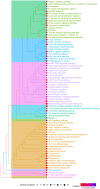Low EGFL7 expression is associated with high lymph node spread and invasion of lymphatic vessels in colorectal cancer
- PMID: 37957249
- PMCID: PMC10643678
- DOI: 10.1038/s41598-023-47132-6
Low EGFL7 expression is associated with high lymph node spread and invasion of lymphatic vessels in colorectal cancer
Abstract
Studies indicate EGFL7 as an important gene in controlling angiogenesis and cancer growth, including in colorectal cancer (CRC). Anti-EGFL7 agents are being explored, yet without promising results. Therefore, the role of EGFL7 in CRC carcinogenesis should be investigated. This study aimed to evaluate the prognostic value of EGFL7 expression in CRC and the signaling pathways influenced by this gene. EGFL7 expression was evaluated through immunohistochemistry in 463 patients diagnosed with CRC and further associated with clinicopathological data, angiogenesis markers and survival. In silico analyzes were performed with colon adenocarcinoma data from The Cancer Genome Atlas. Analysis of enriched gene ontology and pathways were performed using the differentially expressed genes. 77.7% of patients presented low EGFL7 expression, which was associated with higher lymph node spread and invasion of lymphatic vessels, with no impact on survival. Additionally, low EGFL7 expression was associated with high VEGFR2 expression. Finally, we found in silico that EGFL7 expression was associated with cell growth, angiogenesis, and important pathways such as VEGF, Rap-1, MAPK and PI3K/Akt. Expression of EGFL7 in tumor cells may be associated with important pathways that can alter functions related to tumor invasive processes, preventing recurrence and metastatic process.
© 2023. The Author(s).
Conflict of interest statement
The authors declare no competing interests.
Figures




References
Publication types
MeSH terms
Substances
LinkOut - more resources
Full Text Sources
Medical
Molecular Biology Databases

